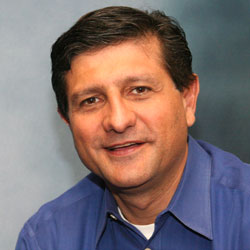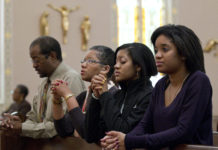Last month when the heat threatened the 120-degree mark, and I was cursing the sidewalk for reflecting it onto my sweated brow, I came upon a homeless man looking for a handout.
He wanted $2 to buy a Big Mac. The temperature was soaring and the weathered look on his face made me grateful for only a little sweat on mine. And there was something about his voice — soft spoken, kind and polite — and his tattered but clean jeans, worn sandals and ripped but clean shirt, that implied a man trying to keep himself together but who was losing the fight. I took a break from my “hectic and difficult life” to spend a little time with him.

“How about instead of a few bucks for a burger I buy you a nice meal at the Italian sub shop around the corner?” I asked.
His eyes lit up with childlike excitement. “Thank you,” he said graciously. “That would be extremely nice.”
As we walked over to the restaurant, his slump straightened, his slow crawl of a walk became a prance, and he propped up his head to speak to me. And there was still that smile.
As we entered the restaurant, the cashier glared at him, as if ready to kick him out, and then looked back at me, then back at him again, only this time more courteously realizing he was with me.
“What would you like,” I said to him as I glanced at the menu. For a few seconds he stared silently at me, as if he didn’t know what to do. And then he uttered, “Oh, anything is alright — whatever you want to get me.”
It was as if he had grown out of having the freedom to choose. So I reiterated, “No, you decide, whatever you want on the menu is my treat.”
Again he was an excited child, as he enthusiastically scoured the menu of options. Then he did something amazing — he began to order and act like an everyday person again.
“I’ll have the tuna special — and can I please have some extra mayonnaise on that.” He continued, “Oh, and can I get that on wheat, and does that come with any sides? Ok great how about a little side of potato salad?”
Then suddenly he snapped back as if maybe he went too far and this kindness would be snatched away from him for asking for too much. “Is that OK?” he asked.
“Of course,” I responded matter-of-factly as I handed him a cup from the stack by the register. “Don’t forget to get yourself a drink, and you better make it a large — it’s hot out there.” I didn’t think his smile could get any bigger, but it did.
Special moment
As we waited for his meal, we chatted about the weather, about life in general, not his particular situation, and about music (he carried an empty guitar case with him).
Then when his meal came, I left him to enjoy it in the air-conditioned comfort of the restaurant, and I said, “See you around.”
He retorted, “Stay cool,” just like any other every day person.
Now I know his situation isn’t going away because I bought him lunch. That’s why we have incredible organizations like Catholic Charities, St. Vincent de Paul, Goodwill, etc. And if I run into him again, I will do my best to connect him with one of them.
But for one single, special moment, he felt like an everyday person again, and I felt more human because of it.
And that is worth a whole lot more than the price of the lunch.




![[VIDEO] Make Sunday feel like Sunday again](https://www.catholicsun.org/wp-content/uploads/2021/04/2021-YOUTUBE-BISHOP-MESSAGE-THUMBNAIL-ENGLISH-218x150.png)

